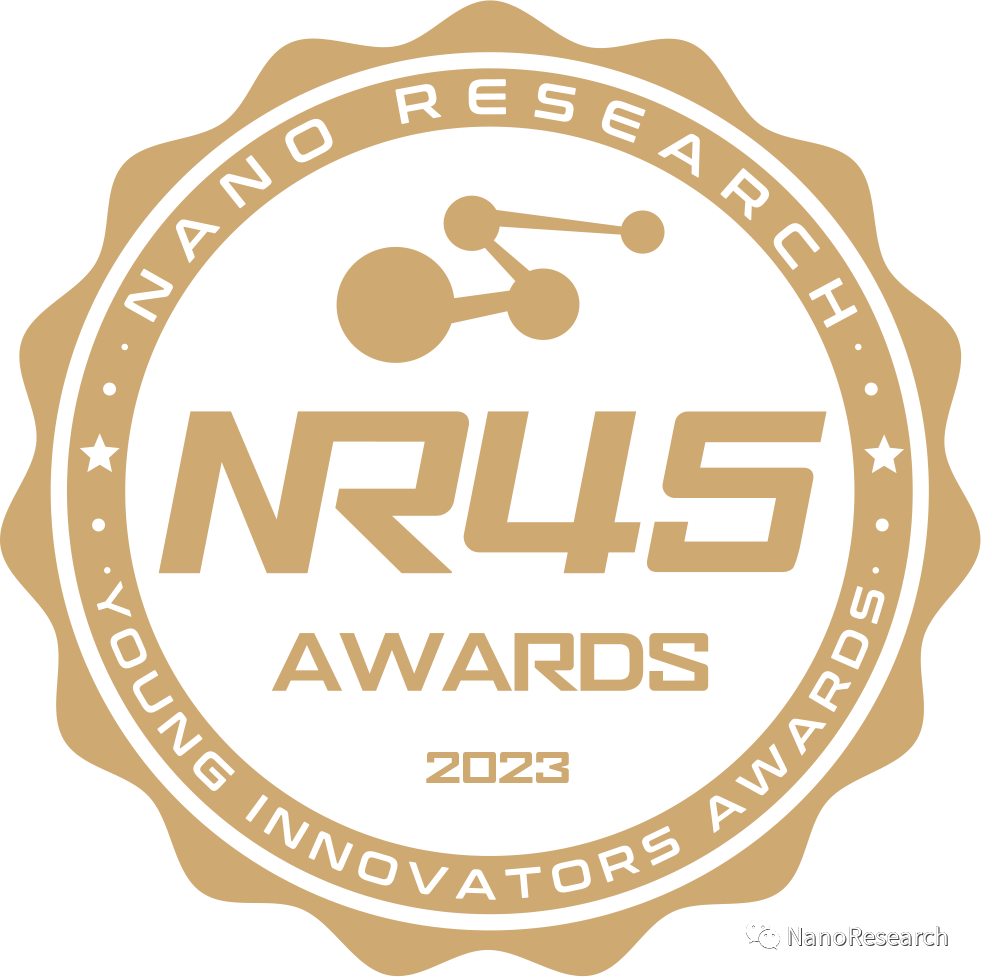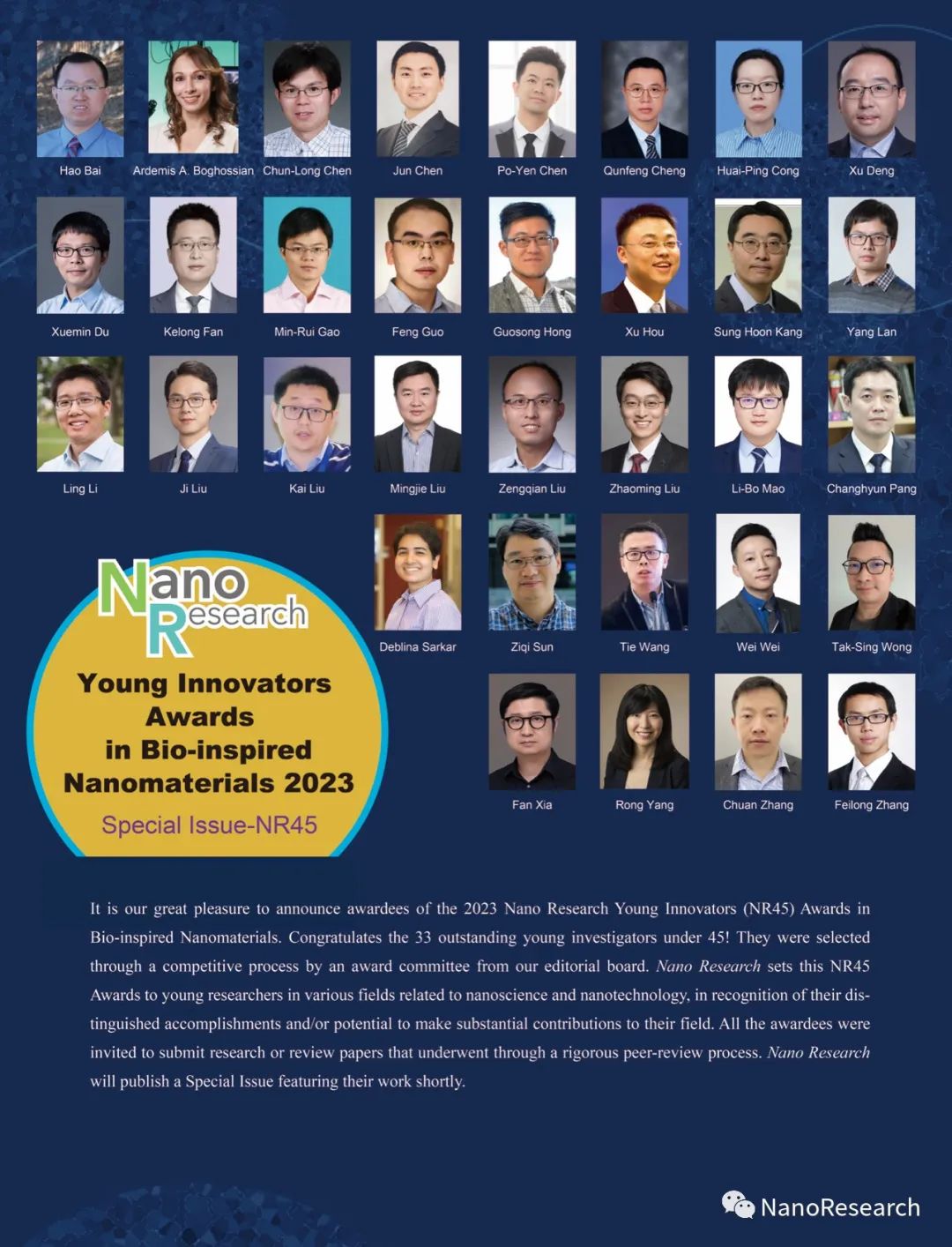博文
2023年度纳米研究青年科学家奖(NR45 Awards)—纳米仿生材料领域获奖名单及奖项专刊  精选
精选
||
为表彰献身科学事业、潜心钻研学术、长期从事纳米科学和纳米技术前沿领域研究并做出杰出贡献的优秀青年科学家,《纳米研究》编辑部设立了年度纳米研究青年科学家奖(Nano Research Young Innovators (NR45) Awards)。此奖项候选人由《纳米研究》编委会中一线科学家推荐、由奖项委员会严格评选,最终获奖人为有望实现重大科研突破、在该领域具有潜力做出巨大贡献、现已取得杰出成就的青年科学家。纳米研究青年科学家奖 (NR45 Awards) 每年按照科研领域授予最多45位年龄不超过45岁的优秀青年科研人员。我们非常荣幸地宣布2023年纳米仿生材料领域纳米研究青年科学家奖 (NR45 Awards) 的获奖者如下,祝贺这33位45岁以下的杰出青年科学家!同时《纳米研究》组织了相应的奖项专刊,所有论文均来自本届纳米研究青年科学家奖 (NR45 Awards) 获奖青年科学家研究团队。奖项专刊将于2024年2月期出版,欢迎各位专家阅读。
到目前为止《纳米研究》已经成功评选出五届纳米研究青年科学家奖(NR45 Awards),共有187位纳米领域的国内外青年才俊入选。往届获奖名单和专刊如下。
2022年度纳米研究青年科学家奖(NR45 Awards)—纳米催化领域获奖名单及奖项专刊
2021年度纳米研究青年科学家奖(Nano Research Young Innovators (NR45) Awards)—二维材料获奖名单及奖项专刊
Nano Research Young Innovators Awards in NanoEnergy 2019
Nano Research Young Innovators Awards in NanoBiotech 2018
鉴于在科研领域里,青年科学家普遍活跃、精力旺盛、思路新颖、研究想法丰富,有较多产生科研新突破的机会,同时许多杰出科学家都是在中青年时期就取得了重大的原创性科研成果或者成功解决了业界关键的核心技术难题,因此《纳米研究》对青年科学家的投稿十分重视,特别是对于国家重点支持的青年科学家来稿,编辑部都会重点关注并且快速审稿,为青年科学家的学术工作提供便捷服务。
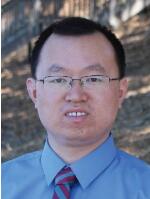
Hao Bai is a professor at College of Chemical and Biological Engineering, Zhejiang University. His research interests fall in multiscale design and fabrication of bioinspired materials, including polar-bear-hair-inspired thermal fibers and textiles, multifunctional porous materials. His research has been published in Science, Nature, Nature Materials, Nature Communications, Science Advances, and Advanced Materials, with more than 13,000 citations. He has won the Excellent Youth Project of the National Natural Science Foundation of China, Qiu Shi Outstanding Youth Scholar Award from the Qiu Shi Science and Technology Foundation.
Energy-absorbing porous materials: Bioinspired architecture and fabrication

Ardemis A. Boghossian received her B.S.E. degree in Chemical Engineering from the University of Michigan. She earned her Ph.D. in nanotube photophysics at the Massachusetts Institute of Technology (MIT), working under the supervision of Michael S. Strano. Expanding her experience to bioengineering, she conducted her postdoctoral research under the supervision of Frances H. Arnold at the California Institute of Technology (Caltech). She has since joined the faculty at the Ecole Polytechnique Federale de Lausanne (EPFL). Her laboratory focuses on tackling applications that are limited by inefficient interactions at the biological-synthetic material interface through concomitant biological and nanomaterials engineering.
In vivo polydopamine coating of Rhodobacter sphaeroides for enhanced electron transfer

Chun-Long Chen received his Ph.D. from Sun Yat-Sen University in 2005 with Prof. Cheng-Yong Su and Prof. Bei-Sheng Kang. He is currently a senior research scientist at Pacific Northwest National Laboratory (PNNL). He is also an affiliated professor in the Department of Chemical Engineering and Department of Chemistry at the University of Washington. His group is tackling the challenges of developing sequence-defined peptoids for assembly of biomimetic materials and for controlling inorganic crystal formation, aiming at the design and synthesis of bioinspired functional materials that rival those found in biology.
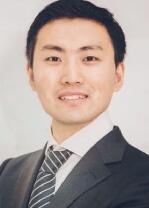
Jun Chen is currently an assistant professor in the Department of Bioengineering at the University of California, Los Angeles. His research focuses on soft matter innovation for novel bioelectronics and personalized healthcare. He has published two books and 280 journal articles, with 180 of them being corresponding authors in Chemical Reviews (2), Chemical Society Reviews (2), Nature Review Bioengineering (1), Nature Materials (2), Nature Electronics (5), Nature Biomedical Engineering (1), Nature Communications (6), Science Advances (3), Joule (3), Matter (12), Advanced Materials (15), among others. He also filed 14 US patents, including one licensed. With a current h-index of 105, Dr. Chen was identified to be one of the world's most influential researchers in the field of Materials Science in the Web of Science. Beyond research, he is an associate editor of Biosensors & Bioelectronics, Med-X, FlexMat, VIEW Medicine, and Textiles, Advisory/Editorial Board Members of Matter, Cell Reports Physical Science, Nano-Micro Letters, Materials Today Energy, Nano Trends, and The Innovation. Among his many accolades are the V. M. Watanabe Excellence in Research Award, UCLA Faculty Mentor Award, UCLA Society of Hellman Fellows Award, Advanced Materials Rising Star, Materials Today Rising Star Award, ACS Nano Rising Stars Lectureship Award, Chem. Soc. Rev. Emerging Investigator Award, Georgia Tech Alumni 40 Under 40, Shu Chien Early Career Award, ONR Young Investigator Award, AHA Innovative Project Award, AHA Transformational Project Award, AHA's Second Century Early Faculty Independence Award, NIH UCLA CTSI KL2 Translational Science Award, BBRF Young Investigator Award, ACS PMSE Young Investigator Award, Okawa Foundation Research Award, among others.
Bioinspired nanomaterials for wearable sensing and human–machine interfacing

Po-Yen Chen is an assistant professor in the Department of Chemical and Biomolecular Engineering at the University of Maryland (UMD), College Park. He is also an affiliate faculty member of the Maryland Robotics Center (MRC). He earned a Ph.D. in Chemical Engineering from the Massachusetts Institute of Technology (MIT). Prior to joining UMD in 2021, Po-Yen served as an assistant professor in the Department of Chemical and Biomolecular Engineering at the National University of Singapore (NUS) for 2 years. He also held the position of Hibbitt Postdoctoral Fellow at Brown University for 2 years. Po-Yen’s research focuses on the integration of robotics and machine learning to expedite the discovery and development of functional materials. His areas of expertise include stretchable electronics, sustainable nanocomposite innovations, conductive aerogels, and smart soft robots. He has been recognized for his contributions and achievements, including being named as Innovators under 35 in Asia by MIT Technology Review (MITTR) and receiving the AIChE 35 under 35 Award in 2020. He has also received the John C. Chen Young Professional Leadership Scholarship from AIChE and was selected as an Innovative Early-Career Engineer by the National Academy of Engineering for their annual U.S. Frontiers of Engineering Symposium. Currently, Po-Yen serves as the chair of AIChE National Capital Section.
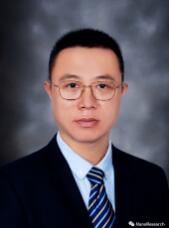
Qunfeng Cheng is a full professor at School of Chemistry, Beihang University. He received his Ph.D. in Polymer Chemistry and Physics from Zhejiang University in 2008. He worked as postdoctoral fellow in Tsinghua University and Florida State University from 2008 to 2009. He joined the School of Chemistry at Beihang University in January 2010. His research interests are focused on bioinspired carbon-based nanocomposites. He has published more than 100 papers in Science, Nat. Mater., Nat. Commun., PNAS, etc., that have received more than 8,000 citation. He has received grant of the National Science Fund for Distinguished Young Scholars, and was awarded Beijing Distinguished Young Zhongguancun Award, the Mao Yi-sheng Science and Technology Award-Beijing Youth Science and Technology Award, etc.
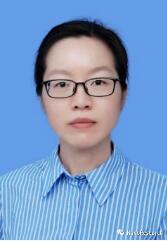
Huai-Ping Cong is currently a Huangshan Scholar Professorship at the School of Chemistry and Chemical Engineering, Hefei University of Technology. She received her Ph.D. degree from the University of Science and Technology of China (USTC) in 2009. She worked in Aarhus University, Denmark as a postdoctoral research fellow from 2009 to 2010 and then joined in USTC as an associate professor for two years. Since 2013, she is working in Hefei University of Technology as a full professor. Her research interests focus on nanostructured flexible and intelligent materials and their applications in flexible energy devices and soft actuators.
Stretchable and self-healing conductive fibers from hierarchical silver nanowires-assembled network

Xu Deng is a professor at the University of Electronic Science and Technology of China. He received his Ph.D. in 2013 from the Max Planck Institute for Polymer Research. In 2014, he was a postdoctoral fellow at UC Berkeley and Lawrence Berkeley National Laboratory. In 2017, he was appointed by the president of Max Planck Institute as the head of the Max Planck Partner Group at UESTC. Dr. Deng is interested in understanding wetting dynamics and physical chemistry at interfaces. He has published more than 100 articles as the first author or corresponding author in leading journals such as Science, Nature, Nature Materials to name a few. In 2021, Dr. Deng was admitted as a Fellow of the Royal Society of Chemistry (FRSC). In 2022, He received the Friedrich Wilhelm Bessel Research Award from the Humboldt Foundation.
Liquid-like polymer lubricating surfaces: Mechanism and applications
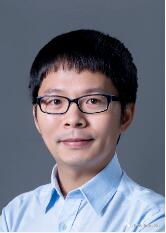
Xuemin Du is currently a professor at Shenzhen Institute of Advanced Technology, Chinese Academy of Sciences (CAS), and he also serves as the Director of Center for Intelligent Biomedical Materials and Devices. He obtained his two Ph.D. degrees from University of Science and Technology of China and City University of Hong Kong. In 2013, he joined the Shenzhen Institute of Advanced Technology, Chinese Academy of Sciences (CAS). His research interests cover mainly intelligent polymers, bio-adaptive interfaces, and smart wearable and implantable devices (e.g., soft sensors & actuators, tissue engineering scaffolds, and bioelectronics). He has published high-impact articles in Science Advances, Matter, Advanced Materials, Advanced Functional Materials, ACS Nano, and National Science Review, etc. He was awarded the National Science Foundation of China’s Excellent Young Scientists in 2020, and the 2021 RSC Nanoscale Emerging Investigator. He is a Youth Committee member of International Society of Bionic Engineering, Micro-nano Actuators and Microsystems Branch of Chinese Society of Micro-Nanotechnology, and Committee member of the Professional Committee of Intelligent Composite Materials of Chinese Society for Composite Materials. He also serves as Associate Editor of Research, and Youth Editor of The Innovation etc.
Recent advances in small-scale hydrogel-based robots for adaptive biomedical applications
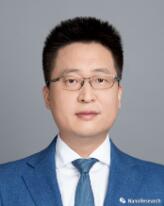
Kelong Fan received his Ph.D. degree in Cell Biology from the Institute of Biophysics, Chinese Academy of Sciences, in 2014. After that, he continued his research there and was promoted to full professor in 2019. He is interested in exploring the novel functions and applications of nanozymes in biomedicine, with a top priority to design functional nanozymes by learning from nature, and to develop novel strategies for disease theranostics. He now serves as an Associate Editor of Exploration, and is selected as Clarivate Highly Cited Researcher in the field of Cross-Field since 2022.
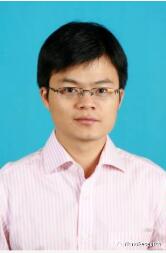
Min-Rui Gao received his Ph.D. degree from the University of Science and Technology of China, under the supervision of Prof. Shu-Hong Yu in 2012. He then did postdoctoral research at University of Delaware and Argonne National Laboratory (USA; 2012−2015). After that, he worked in the Department of Colloid Chemistry, directed by Prof. Markus Antonietti in the Max Plank Institute of Colloids and Interfaces in Potsdam (Germany; 2015−2016). He is currently a full professor at the University of Science and Technology of China. His research interest involves the development of bio-inspired nanostructured materials and their applications in energy fields.
Advances in bio-inspired electrocatalysts for clean energy future
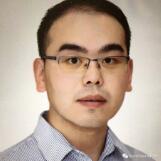
Feng Guo is an associated professor of Intelligent Systems Engineering at Indiana University Bloomington. Before joining Indiana University in 2017, he received his Ph.D. in Engineering Science and Mechanics at Penn State and his postdoc training at Stanford University. His group is developing intelligent medical devices, sensors, and systems to address the challenges in translational medicine with the support of multiple NIH and NSF awards. He is a recipient of the NIH Director's New Innovator Award, the Outstanding Junior Faculty Award at Indiana University, the Dean Postdoctoral Fellowship at Stanford School of Medicine, etc.
Exploiting sound for emerging applications of extracellular vesicles
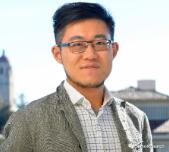
Guosong Hong received his Ph.D. in chemistry from Stanford University in 2014 and then carried out postdoctoral studies at Harvard University. Dr. Hong joined Stanford Materials Science and Engineering and Neurosciences Institute as an assistant professor in September 2018. His research at Stanford aims to develop and apply novel optical and electronic materials for minimally invasive brain interfacing. He is a recipient of the NIH Pathway to Independence (K99/R00) Award (2017−2022), the MIT Technology Review “35 Innovators Under 35” Award (2019), the Science PINS Prize for Neuromodulation (2020), the NSF CAREER Award (2021), the Walter J. Gores Award for Excellence in Teaching (2021), the Rita Allen Foundation Scholars Award (2021), the Stanford Tau Beta Pi Teaching Honor Roll (2023), the Nanoscale Emerging Investigators Award (2023), and the Young Innovator Award in Nano Research (2023).
Bioinspired nanotransducers for neuromodulation
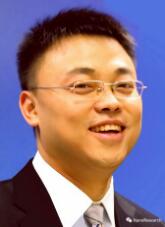
Xu Hou is the director of Institute of Electrochemical Science and Engineering of Xiamen University and the deputy director of State Key Laboratory of Physical Chemistry of Solid Surfaces, China. His team focuses on liquid-based materials and bio-inspired nanofluidic iontronics. His leading "liquid gating technology", was selected by International Union of Pure and Applied Chemistry (IUPAC) as one of the top ten emerging technologies in chemistry in 2020.
Bioinspired nanofluidic iontronics for brain-like computing

Sung Hoon Kang is an assistant professor in the Department of Mechanical Engineering and Hopkins Extreme Materials Institute at Johns Hopkins University. He earned a Ph.D. degree in Applied Physics at Harvard University. Sung Hoon has been investigating behaviors of coupled material systems based on inspiration from nature to address current challenges in engineering materials, structures and devices with applications including resiliency, sustainability, sensing, energy, and healthcare.
Bioinspired nanocomposites with self-adaptive mechanical properties
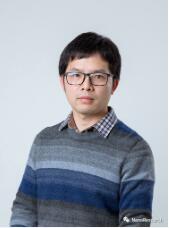
Yang Lan is an assistant professor in the Department of Chemical Engineering at University College London (UCL), specializes in colloidal materials, supramolecular self-assembly, membrane engineering, and solar photocatalytic carbon dioxide reduction. In 2015, he obtained a Ph.D. in Chemistry from the University of Cambridge in the United Kingdom. He subsequently conducted postdoctoral research at the Cavendish Laboratory, University of Cambridge (2015−2017), and the Chemical & Biomolecular Engineering Department at the University of Pennsylvania in the United States (2017−2019). In June 2019, he established his independent research group at University College London. His research group focuses on developing nature-inspired adaptive materials & systems for innovative solutions to address grand challenges in environment and sustainability. Of specific interest is the design and fabrication of functional polymeric membranes for water treatment, proton-exchange, CO2 adsorption, capture, and/or separation; as well as developing effective photocatalysts for hydrogen evolution, CO2 reduction, and plastic recovery.
Bioinspired supramolecular macrocycle hybrid membranes with enhanced proton conductivity
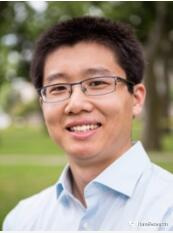
Ling Li currently serves as an associate professor and holds Mary V. Jones Faculty Fellow position in the Department of Mechanical Engineering at Virginia Tech. He earned both his B.S. and Ph.D. degrees both in Materials Science and Engineering from NUS and MIT, respectively. Following his doctoral studies, Dr. Li conducted postdoctoral research at Harvard before starting his faculty position at Virginia Tech in 2017. Dr. Li’s research focuses on biological and bio-inspired materials, aiming to uncover “the Materials Rules of Life” for biological structural and multifunctional materials as well as to utilize the learned principles to develop novel synthetic materials. Dr. Li has garnered recognition through various prestigious awards, including the Rosalind Franklin Young Investigator Award, AFOSR Young Investigator Award, Outstanding Assistant Professor at Virginia Tech, 3M Non-Tenure Faculty Award, NSF CAREER Award, and College of Engineering Faculty Fellow. His research findings have been published in Science, PNAS, Nature Materials, Nature Communication, among others, and have received extensive coverage in many global media outlets.
Structural engineered living materials
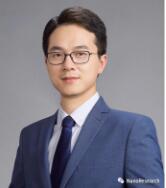
Ji Liu is an associate professor in the Department of Mechanical and Energy Engineering at Southern University of Science and Technology. He obtained his Ph.D. degrees in Physiochemistry of Condensed Materials from the University of Bordeaux (France) and in Chemistry from the University of Liege (Belgium) in 2013. He then conducted postdoctoral research at the University of Cambridge (UK) in 2018 and the Massachusetts Institute of Technology (US) in 2019. He also served as a visiting fellow at Harvard Medical School in 2019. His research group is advancing the functional soft material design, fabrication, engineering, and applications in bio-interfaces, dynamic adhesion and human-machine interfaces, etc.
Hydrogel bioadhesives harnessing nanoscale phase separation for Achilles tendon repairing
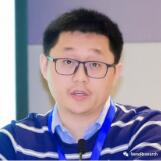
Kai Liu received his Ph.D. degree from the University of Groningen in The Netherlands in 2015. Then he pursued his postdoctoral studies at Harvard University. In 2017, he was appointed as a principal investigator at the Changchun Institute of Applied Chemistry of the Chinese Academy of Sciences, China. In 2020, he moved to the Department of Chemistry of Tsinghua University in Beijing and in 2023 was promoted to a tenured full professor, during which he is heading a laboratory performing research on the interface of biosynthetic chemistry and material technology. In the past years, he has published more than 160 papers in high-ranked journals and 40 patents are issued. He has been given several talent awards including National Science Fund for Distinguished Young Scholars, The Netherlands Organization for Scientific Research (NWO) Rubicon Award, the Chemical Biology Young Investigator Award of the Chinese Chemical Society, Rare Earth Science & Technology Award. Besides, he is serving as peer-review editor or editorial board for several journals, including CAE flag journal Engineering and ACS Applied Bio Materials.
Engineered spidroin-derived high-performance fibers for diverse applications
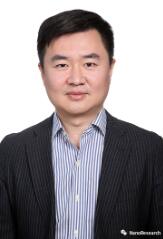
Mingjie Liu is now the professor and dean of school of Chemistry in Beihang University. He received his B.S. degree in applied chemistry (2005) from Beijing University of Chemical Technology. In 2005, he joined Prof. Lei Jiang’s group and received his Ph.D. degree from the National Center for Nanoscience and Technology, Chinese Academy of Sciences (2010). He then worked as a postdoc in Prof. Takuzo Aida’s group in Riken in Japan from 2010 to 2015. In 2015, he joined Beihang University and became a full professor. He has published 150+ papers in prestigious journals such as Nature, Nat. Rev. Mater, Nat. Mater. Nat. Commun., Angew. Chem. Int. Ed. and Adv. Mater. His scientific interests focus on design and fabrication of high mechanical performance polymeric materials and explore their applications in anti-biofouling coatings, flexible electronics and soft robotics. He was awarded the National Science Fund for Distinguished Young Scholars (2017), The Outstanding Young Scholars of International Society of Bionic Engineering (2019) and the Chinese Chemical Society-Royal Society of Chemistry Young Chemistry Award (2022).
Large-area ultrastrong and stiff aramid nanofiber based layered nanocomposite films
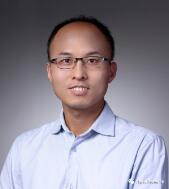
Zengqian Liu is a professor in the Institute of Metal Research, Chinese Academy of Sciences (IMR, CAS). He received his Ph.D. degree from Beihang University in 2013, and worked with Prof. Zhefeng Zhang at IMR, CAS as a T. S. Ke research fellow from 2013 to 2015. From 2015 to 2017, he worked with Prof. Robert O. Ritchie at the University of California, Berkeley as a postdoctoral research associate. He works in the field of bioinspired materials and structures with a special focus on their mechanical properties, aiming to achieve the strengthening and toughening of structural materials by implementing bioinspired designs.
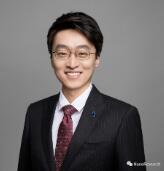
Zhaoming Liu received his BS degree (2013) and Ph.D. degree (2017) from Zhejiang University under the supervision of Prof. Ruikang Tang. Then he works in Department of Chemistry, Zhejiang University, and he began his independent career as a ZJU100 Young Professor in December 2020. His research interests are materials chemistry, crystal growth and biomineralization. He is now focusing on arrangement of inorganic ions for materials construction.
Inorganic ionic polymerization: From biomineralization to materials manufacturing

Li-Bo Mao completed his Ph.D. at University of Science and Technology of China (USTC) in 2016. He continued his research in USTC and is now an assistant research fellow. His research interests include biomimetic mineralization, biological materials and biomimetic structural materials. His work has been published on Science, JACS, Angew. Chem., Adv. Mater., Nano Res., Innovation, Adv. Funct. Mater., and etc.
Biomimetic chitin hydrogel via chemical transformation
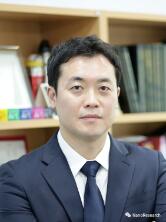
Changhyun Pang is currently conducting independent research since 2014 as an associate professor in the School of Chemical Engineering and Samsung Advanced Institute for Health Science & Technology at Sungkyunkwan University (SKKU). His research interests are in bioinspired materials and interfaces for i) bioinspired adhesion and wetting, ii) bioelectronics interface, and iii) smart soft robotics, and he has published numerous highly cited papers in this regard. During his career, he is selected as a member of Young Korean Academy of Science and Technology (Y-KAST), and has awarded several prestigious awards, including the Science and Technology Award from the Korean government, the Outstanding Polymer Young Scientist Award from the Korean Society of Polymers, MRS GSA Silver Award in Materials Research Society (MRS), and Golden Prize in SamsungHuman Tech Thesis Prize. After receiving his doctorate from Seoul National University in 2012, he worked as a postdoctoral researcher in the Department of Chemical Engineering at Stanford University from 2012 to 2013.
Intelligent structured nanocomposite adhesive for bioelectronics and soft robots

Deblina Sarkar is an assistant professor at Massachusetts Institute of Technology and AT&T Career Development Chair Professor at MIT Media Lab. She heads the Nano-Cybernetic Biotrek research group and carries out trans-disciplinary research fusing engineering, applied physics, and biology to develop disruptive technologies for nanoelectronic devices and create new paradigms for life-machine symbiosis. Her inventions include among others, the first non-surgical brain implant, a 6-atom thick channel quantum-mechanical transistor overcoming fundamental power limitations and technology that reveals previously undiscovered biological building blocks of the brain. Her Ph.D. dissertation was honored as one of the top 3 dissertations throughout USA and Canada in the field of Mathematics, Physical sciences and all departments of Engineering. She is the recipient of numerous other awards and recognitions, including the Technology Review’s Innovators Under 35 from India, NIH K99/R00 Pathway to Independence Award, the IEEE Early Career Award in Nanotechnology, Innovative Young Engineer Recognition from National Academy of Engineers, the NIH Director’s New Innovator Award with the highest and rarely achieved impact score, the MIND Prize, the Science News 10 Scientists to Watch, the Distinguished Scientist Award and many others.
Two-dimensional magnetic materials for spintronic applications
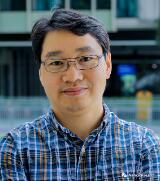
Ziqi Sun, Fellow of the Higher Education Academy and Fellow of the Royal Society of Chemistry, is currently a full professor and ARC Future Fellow at the Queensland University of Technology (QUT), Australia. Ziqi received his Ph.D. degree from Institute of Metal Research, Chinese Academy of Sciences in 2009. After one-year experience as NIMS postdoctoral fellow (Japan), he joined University of Wollongong (UOW), Australia in 2010 and moved to QUT as a faculty member in 2015. His research interest includes developing bio-inspired smart nanomaterials and 2D metal oxide nanomaterials for sustainable energy and environmental applications, such as rechargeable batteries, oil-water separations, and sustainable fuel generations. Ziqi serves as the Editor-in-Chief of Sustainable Materials and Technologies (Elsevier, IF = 9.6), Principal Editor of Journal of Materials Research (MRS), and Associate Editor of Surface Innovations (ICE).
Bioinspired designs in active metal-based batteries
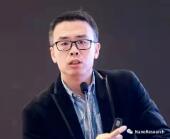
Tie Wang, a doctoral supervisor, has been dedicated to research and application in disease in vitro analysis and detection, with a focus on the self-assembly structure of nanomaterials. He has conducted systematic original work addressing key scientific issues in disease biomarker detection, resulting in a series of innovative achievements and outstanding performance. Notably, he has developed a portable breath analyzer for lung cancer, breaking through real-time online early lung cancer screening technology. Clinical trials for early disease detection have been initiated. Ultimately, he has established a comprehensive research platform covering basic research, instrument development, and clinical testing. His research contributions are reflected in over 110 publications in core journals such as Science, J. Am. Chem. Soc., Adv. Mater., Angew. Chem., Nat. Commun., Sci. Adv., with over 5800 citations. He has applied for 20 invention patents, of which 12 have been granted.
Organic thin-film transistors and related devices in life and health monitoring
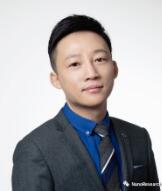
Wei Wei received his Ph.D. from the State Key Laboratory of Biochemical Engineering, Institute of Process Engineering, Chinese Academy of Sciences (CAS). He was promoted to a full professor in 2018, and was supported by the National Natural Science Fund for Distinguished Young Scholars in 2022. He is currently the director of Key Laboratory of Biopharmaceutical Preparation and Delivery, CAS. His research focuses on biomimetic formulation engineering for clinical translation, with over 130 papers published in academic journals (e.g., Nature, Nature Nanotechnology, Nature Biomedical Engineering, and Science Translational Medicine).

Tak-Sing Wong is a professor of Mechanical Engineering and Biomedical Engineering at The Pennsylvania State University. His research focuses on surface and interfacial engineering, micro- and nanomanufacturing, as well as bio-inspired materials design. Dr. Wong is a pioneer in the development of pitcher-plant inspired slippery surfaces and synthetic brochosomes. Dr. Wong has received numerous awards and honors, including an R&D 100 Award, an NSF CAREER Award, a DARPA Young Faculty Award, an NAE Frontier of Engineering Invitee, the IEEE Nanotechnology Council Early Career Award, the ASME Sia Nemat-Nasser Early Career Award, the Distinguished Alumni Award from the CUHK Faculty of Engineering, the Nano Research Young Innovators Award, and Innovators Under 35 (Global), formerly known as TR35, by MIT Technology Review. Dr. Wong has also been honored by the White House with the Presidential Early Career Award for Scientists and Engineers (PECASE). Dr. Wong is a Fellow of the ASME.
Synthetic brochosomes: design, synthesis, and applications

Fan Xia’s scientific interest is focused on bio-analytical chemistry, interfacial wetting and artificial ion channels. Specifically, his group has developed new strategies for constructing nanochannels with controlled structures, and revealed the influence of functionalization at inner/outer surfaces of nanochannels on the ion transport properties. Based on the nano-confined ionic current signals, they have developed a signal-enhancing mechanism for detecting various biosignals (e.g., proteins, nucleic acids, biomolecules and ions), achieving highly sensitive and unique detection at different scales. Untilnow, he has published more than 300 high impact papers, including Chem. Rev., Chem. Soc. Rev., Chem, Nat. Commun., J. Am. Chem. Soc., Angew. Chem. Int. Ed., Nano Lett., Nat. Protoc., Anal. Chem., ACS Sens., Adv. Mater., Adv. Funct. Mater., Proc. Natl. Acad. Sci. U.S.A. etc. The total citation is > 15000 times, and current H-factor is 60.
Superwettable interface towards biodetection in confined space

Rong Yang is an assistant professor at the R.F. Smith School of Chemical and Biomolecular Engineering at Cornell University and a Faculty Fellow at the Cornell Atkinson Center for Sustainability. She received her B.S. in Chemical Engineering in 2009 from Tsinghua University in Beijing, her M.S. in Chemical Engineering Practice from MIT in 2012, and her Ph.D. in Chemical Engineering from MIT in 2014. From 2014-2016, she was a postdoctoral fellow at Boston Children’s Hospital and Harvard Medical School, where she later became an assistant professor before joining Cornell in 2019. Her research lies at the intersection of material science and biomedical engineering, focusing on all-dry polymer synthesis techniques, functional nano- or living materials with controlled morphology and reactivity, and their application in drug delivery, infectious disease treatment, and environmental sustainability. Her work has been recognized by the NIH Pathway to Independence Award, the NSF CAREER Award, the ACS PMSE Young Investigator Award, and the Intel® Rising Star Faculty Award, among others.
Bioinspired nanomaterials for the treatment of bacterial infections

Chuan Zhang is a professor in the School of Chemistry and Chemical Engineering, Shanghai Jiao Tong University. His research interests focus on the developments of novel nucleic acid-based therapeutics, nucleic acid nanotechnology and supramolecular self-assembly, as well as drug and gene delivery. He was the recipient of the Qiu Shi Outstanding Young Scholar Award (Qiu Shi Science & Technologies Foundation, Hong Kong, 2014), National Science Fund for Distinguished Young Scholars of China (NSFC, 2022).
EGFR-targeted and gemcitabine-incorporated chemogene for combinatorial pancreatic cancer treatment
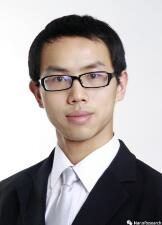
Feilong Zhang is currently a professor at Technical Institute of Physics and Chemistry, Chinese Academy of Sciences. He received his BS degree from the University of Science & Technology Beijing (USTB, 2012) and his Ph.D. from the Institute of Chemistry Chinese Academy of Sciences (ICCAS, 2018) under the supervision of Prof. Shutao Wang and Prof. Lei Jiang. He then worked as a postdoctoral research fellow in Prof. Xiaodong Chen’s group at the School of Materials Science and Engineering, Nanyang Technological University (2018-2023). His research focuses on the design and fabrication of 3D devices and smart flexible electronics for plant monitoring and modulation.
Bioinspired strategies for biomimetic actuators from ultrafast to ultraslow
NR45 Awards in Bio-inspired Nanomaterials, 2023.pdf
Nano Research(《纳米研究》(英文版))是由教育部主管、清华大学和中国化学会主办的高水平国际学术期刊。主要发表在纳米研究领域具有原创性的世界一流科研论文以及世界顶级科学家撰写的权威性、全面性的综述论文,文章内容涉及纳米研究领域的各个方面。该刊于2008年7月创刊,2010年1月被SCI-E收录。经过10余年发展,已成为全球纳米领域具有重要影响力的学术期刊之一。2015年开始增加刊文量,国际影响力日益提升,2022年影响因子为9.9,总被引频次位居国内SCI期刊首位。本刊曾获得中国出版政府奖期刊奖、中国百强科技期刊、中国高校精品科技期刊奖、高校精品科技期刊工程等多项国家和省部级奖项,并获得“中国科技期刊国际影响力提升计划”A类、“中国科技期刊登峰行动计划”、“中国科技期刊卓越行动计划”领军期刊项目等多项资助。
本刊特色:
● 审稿周期短(约2周)
● 接收后24小时内在线出版
● 开设绿色通道快速评审原创突破性成果
● 高质量论文免费开放(Open Access)两个月
● 推介渠道广(网站、微信公众号、Facebook、Twitter、EurekAlert!、邮件推送、参办国内外学术会议等)
● 免费发表,国内IP全文免费下载
网站:www.thenanoresearch.comwww.sciopen.com/journal/1998-0124Twitter: @research_nanoFacebook: @NanoResearchTUPWechat Official Account: Nano_Research
https://blog.sciencenet.cn/blog-3534092-1423200.html
上一篇:康飞宇/杨全红/李峰/吴丁财等综述: 超结构碳材料的设计与能源应用
下一篇:2024年碳未来青年研究者奖开放申请
全部作者的精选博文
- • 【应急期刊】Lifeline Emergency and Safety | 无网格粒子法技术在生命线灾害模拟中的应用综述
- • 哈尔滨工业大学柏跃磊/上海大学刘斌等:基于机制引导的高熵稀土双硅酸盐CMAS腐蚀抗性与服役寿命预测
- • 武汉理工大学邹浩然/张文/张帆等:协同界面电子结构与多组分活性调控,实现低能垒高效析氢催化体系构建
- • 立足中国,服务世界|JICV正式回归自主平台SciOpen
- • 陕科大欧阳海波等:受榫卯连接启发界面结构设计协同增强Cf/(HfNbTaTiZr)C-SiC复合材料的力学和抗热冲击性能
- • 上海交通大学高温热防护涂层团队范晓慧等:原位碳热还原制备高强度各向异性ZrC/YSZ复合泡沫陶瓷的研究
